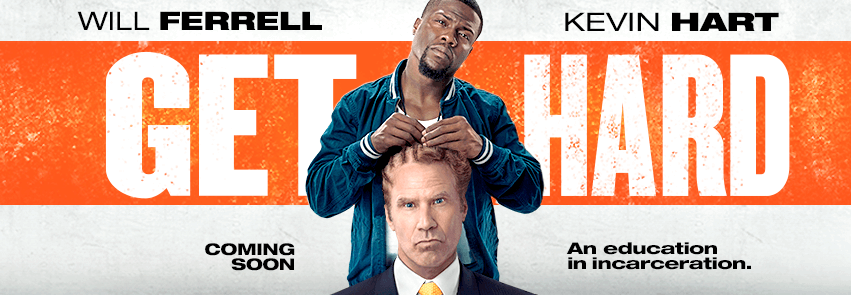

How It Is
There Is Nothing Bromantic About “Get Hard”
Hollywood has a long tradition of creating exploitative Black-White "buddy" movies. But Kevin Hart and Will Ferrell's upcoming comedy takes things to a new, dangerous low.
This article was made possible because of the generous support of DAME members. We urgently need your help to keep publishing. Will you contribute just $5 a month to support our journalism?
You know you’ve reached the danger zone when a movie billboard makes you so mad you want to hawk spit or worse. Warner Bros.’ forthcoming interracial “buddy” comedy Get Hard, which comes to theaters on March 27, portrays a coonstastic Kevin Hart corn-rowing Will Ferrell’s hair. Get Hard tells the story of a wrongfully convicted White investment banker, who prepares for prison life, and enlists the help of the Black man who washes his car—appointing him as his personal Yoda. The mere premise is straight from the Hollywood racist template. And what a perfect metaphor this is for so much of what is wrong in racist-ass America today.
Ferrell’s character is wrongfully convicted of financial crimes. And we’ve come to know by now that White dudes who commit financial crimes hardly ever get thrown in prison. And even those unjust sentences are for white-collar crimes. White people generally don’t end up in prison for dealing drugs or, say, killing an unarmed Black youth. Why does he turn to Hart’s character? Because he knows all about surviving prison because … wait for it, wait for it: He’s Black.
Original, right? Hollywood is on a racist roll, dissing Selma and now this blatant display, with Kevin Hart looking like a menacing little Black Sambo, and Will Ferrell pulling a face as he practices a mean mug, is just part of a long history of Hollywood White-Black “buddy” films, where a dorky, wussy White dude turns to a Black man for wisdom and strength. The title is laden with sexual multi-entendres, among them, the stereotype of the soft, White guy, the easiest target in prison for a gang rape, presumably by a bunch of “hard” Black and Latino guys. Despite popular culture efforts, rape is never funny; the pleasure derived from jokes surrounding sexual violence in prison embodies the level of dehumanization directed at those incarcerated.
And, of course, the pun of “get hard” reflects the narrowness that we see in popular images of Black men. To be a young Black man who is authentic and keeping it real, is to be tough, menacing, ruthless, and therefore, hard. Yet, despite the prominence of these dehumanizing stereotypes that reduce Black masculinity to “being hard,” within Hollywood and on the nightly news, it is hip-hop that is blamed for the gangsta mentality.
As if the stereotypes aren’t problematic enough, this “entertainment” is set against a backdrop of our nation’s increasingly brutal and blatant school-to-prison pipeline for Black people and the continuing horror show of cops and vigilantes shooting and choking the life from unarmed Black bodies. School suspensions, mass incarceration, and blue-on-Black murders are all justified with references to the Warner Bros.’ produced vision of Black masculinity.
Let us not forget this week’s viral news story about SAE fraternity members at the University of Oklahoma (and their elderly house mother) burning up the internet with their hateful racist chants starring endless repetitions of the N-word and references to lynching. And, of course, this prompted 24-hour-news-talking-head morons to blame hip-hop. You may not think a silly comedy from Warner Bros. isn’t as culpable, because it doesn’t have the same cachet—but it does.
Because it is not just a movie billboard.
It is not just a trailer.
It is not just a movie.
Each is selling something of historic significance. The Hollywood machine delights in churning out comedies centered around people of color in prison, like the hit Netflix series Orange Is the New Black, and the MSNBC’s weekend marathons of Lock Up and Lock Up Raw. They fuel dangerous stereotypes with violent sexual undertones. The reality of racism and the prison industry, now publicly recognized, as Michelle Alexander’s landmark book calls it, The New Jim Crow, reveals the stakes here.
Get Hard, written by Ian Roberts and Jay Martel, and directed by Etan Cohen—all White men—is a remix of an old, comfortable trope that’s been with us since Mark Twain’s 1884 classic The Adventures of Huckleberry Finn, which centers on a friendship between Huck, a young White boy and an escaped slave named “Nigger Jim.” In his landmark book, Toms, Coons, Mulattoes, Mammies and Bucks: An Interpretive History of Blacks in American Film, Donald Bogle identifies the “Huck Finn fixation”: “The good Black man brings to his White loner friend an element of calm control and budding maturity.” In these films, we see a Black and White male who are thrown together by circumstance and have learned to love each other enough to transcend their mutual prejudices. The Black subordinate/servant’s function is to reinforce the self-esteem of his outcast companion and help him to overcome his emotional anxieties and afflictions. Their relationship becomes a source of growth and redemption for the White character and the nation as a whole.
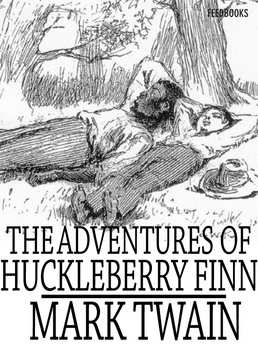
The earliest onscreen version of this trope appeared in 1958 with the hit film The Defiant Ones, starring Sidney Poitier and Tony Curtis who play escaped prisoners chained together. To survive, the two must learn to get along and cooperate—an interesting premise in a still-very-segregated America. Their joint struggle facilitates an end to their own prejudices, resulting in a beautiful bond based on their common humanity.
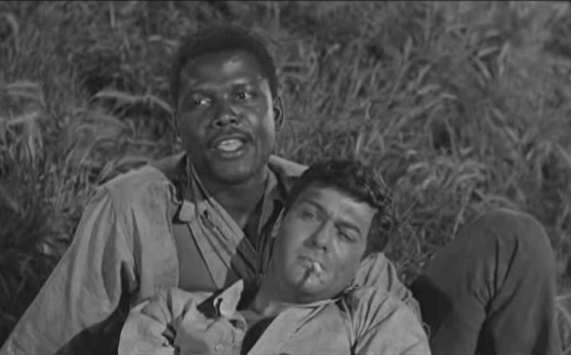
Comedians Richard Pryor and Gene Wilder turned their magical onscreen chemistry into several movies, from Silver Streak in 1976 to Stir Crazy in 1980, See No Evil, Hear No Evil in 1989, and Another You in 1991. Consistent throughout was the theme of bromantic racial harmony as the antidote to society’s ills.
The super-popular five-film franchise Lethal Weapon kicked off in 1987 with Danny Glover and Mel Gibson (before we knew he was a raging racist and an anti-Semite) as opposites-attract cops forced to learn to cooperate and get along in order to succeed at work.
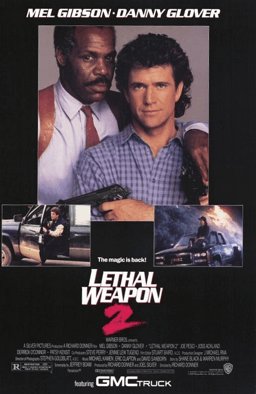
In 1994, The Shawshank Redemption paired Tim Robbins and Morgan Freeman as prisoners. Robbins’s character was, of course, innocent and wrongly imprisoned, while Freeman’s character played the sage who was wise to the ways of prison life.
Then in 1996, Tom Cruise buddied up as a failing sports agent and Cuba Gooding Jr., as his super-driven client, made Jerry Maguire an Oscar-winning super-hit.
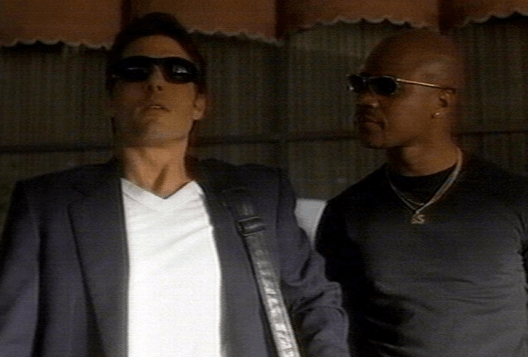
In 2005, Will Smith plays New York City’s top matchmaker to Kevin James’s awkward leading man in a light-hearted romantic comedy Hitch. We’ve seen this relationship for decades in movies like 48 Hours, Beverly Hills Cop, Hardball, Green Mile, Glory, White Men Can’t Jump, Sister Act, The Matrix, and countless others.
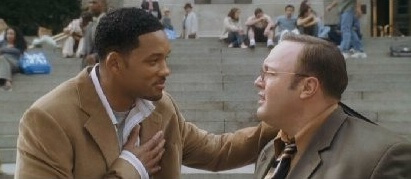
Enter Kevin Hart, who started 2015 off with The Wedding Ringer in which he plays a best man for hire to Josh Gad’s socially awkward and friendless groom, with an unexpected bromance resulting from their bond. Like Hitch, schlubby White men can find love (and sexual companionship) with the help of Black males. If you need help on the athletic field or in bed, or prison, Black males are, of course, at your service.
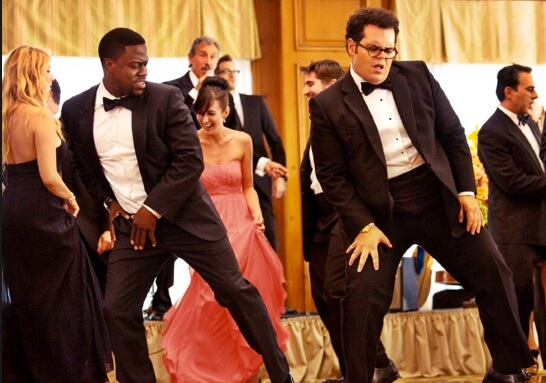
And then, of course, Hart continues the theme more crudely in Get Hard. What’s really behind all this seemingly idyllic interracial interaction anyway?
In their book Screen Saviors: Hollywood Fictions of Whiteness, Hernan Vera and Andrew Gordon note that, “Although the emergence of the Hollywood biracial buddy film (like The Defiant Ones) coincides with the emergence of the Civil Rights Movement, it may paradoxically work as a way to assert the White self and to contain Black aspirations.”
This brings us full circle to Get Hard. The offending billboard plays on the dynamic of Black hair and hairstyles as quick ways for Whites to appear cool, dangerous, edgy, and brave. It is an armor of sorts that renders the White body as to not to be fucked with, as impenetrable. Cornrows on men are visual shorthand for the hard, thuggish, gangsta life—and a symbol of the hypermasculinity ascribed to Black men that White men fear and crave in equal measure.
Just as he did in The Wedding Ringer, and other actors did in past films, Kevin Hart embodies the native informant who, in this case, is teaching his innocent sidekick the ways of street and prison culture. Cross-racial friendships are a source of redemption and protection.
Hart has established himself as the small, safe caricature—always helpful, always happy, always ready to bridge the racial gap that keeps our society unjust and dangerously divided.
This movie will surely be popular among White males, who are taught repeatedly that they are victims of a browning America, a Black man in the White House, the dreaded flood of Latino immigrants, Islamic terrorists, and a culture that has no problem making fun of them. The allure of being “hard” and in charge, on top, the ultimate alpha males again, is at the core of what this film is selling. And if they have to rely upon a safe, imaginary Black sidekick as portrayed onscreen, they are willing to go along with the program, because they expect to always win in the end.
What harm does it do?
First, these forms of entertainment are problematic because these films mirror society’s view of blackness as an object to be consumed in the service of whiteness—Blacks as servants to White success and dominance. These films capitalize on White comfort and pleasure resulting from Black servitude. It is a form of nostalgia that modernizes the practices of slavery.
Second, this genre of movie is a device, begging us to laugh as we imagine a fictitious reality of Black-White male bromance and bonding—so much easier to face than the killings and inequalities, the racist chants and hateful actions, so much more comfortable than having honest conversations about the nature of institutional and societal racism, White privilege, Black rage, and the widening gulf between us.
Third, it trivializes the very real tragedies that litter our newscasts and timelines and underscore the stereotypes that reinforce an unfair, unjust and hostile status quo.
Fourth, this type of movie, of entertainment, reinforces the roles of slavery while underscoring White innocence, goodness and superiority every step of the way. Sometimes it’s subtle and sometimes it’s blatant, but in any case, it’s dangerous. Because real people aren’t one-dimensional onscreen stereotypes. Popular culture diverts our White attention from facing the uncomfortable truths of our world and making a commitment to do something tangible about these injustices.
That’s hard—not the tacky double entendre of Hart’s latest film title—but serious, painstaking, heartbreaking work. The kind we need to do if any kind of progress is to take place, and any kind of future is possible. And the hardest truth of all is that millions of Black men who are locked up, many due to wrongful convictions, could use a Great White Buddy to help balance the scales of justice in the other direction for a change. Let me know when we see that onscreen. Until then, I’m gonna have to pass on seeing this coonery.
Before you go, we hope you’ll consider supporting DAME’s journalism.
Today, just tiny number of corporations and billionaire owners are in control the news we watch and read. That influence shapes our culture and our understanding of the world. But at DAME, we serve as a counterbalance by doing things differently. We’re reader funded, which means our only agenda is to serve our readers. No both sides, no false equivalencies, no billionaire interests. Just our mission to publish the information and reporting that help you navigate the most complex issues we face.
But to keep publishing, stay independent and paywall free for all, we urgently need more support. During our Spring Membership drive, we hope you’ll join the community helping to build a more equitable media landscape with a monthly membership of just $5.00 per month or one-time gift in any amount.
















































































